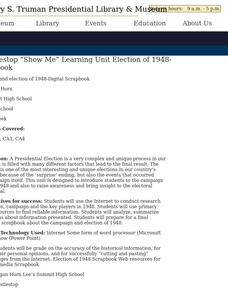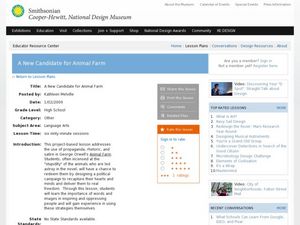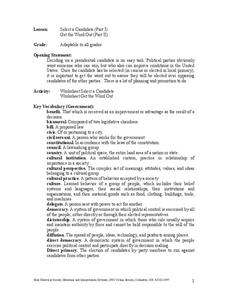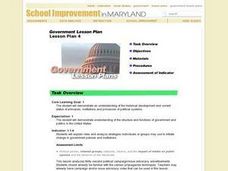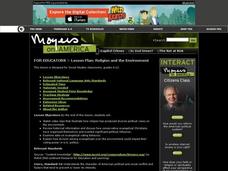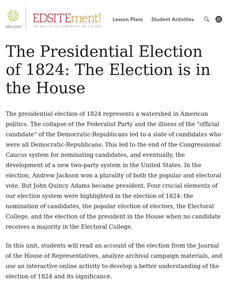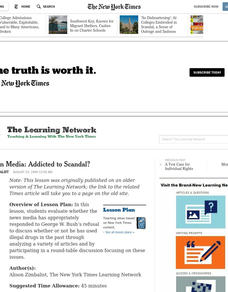Curated OER
Election of 1948-Digital Scrapbook
Students create a digital scrapbook of the election of 1948 -- one of the most interesting and unique elections in US History.
Curated OER
"Street Fight" Lesson Plan
Pupils watch a film which examine the 2002 Newark mayoral election. They experience the electoral process from the viewpoint of a politician.
Curated OER
Candidate Obama Support and President Obama's Agenda
Students research categories within President Obama's agenda and create a PowerPoint presentation. In this President Obama agenda lesson, students research a category within President Obama's agenda and present their topic in a...
Curated OER
A New Candidate for Animal Farm
Students create an advertising campaign in which a candidate from Animal Farm will run for an upcoming election. In this follow-up activity to George Orwell's Animal Farm lesson, students explore propaganda, rhetoric, and satire as they...
Curated OER
A Picture Is Worth a Thousand Words
Seventh graders create a multimedia, image only ad campaign on a contemporary controversial issue. They base their public service announcement, Powerpoint presentation, Web page, or video on methods used by Martin Luther during the...
Curated OER
Candidate Debate; Making Informed Voting Decisions
Pupils study the concept of what it means to be an informed voter who makes conscientious voting decisions based on significant information. In this making informed voting decisions lesson plan, students are introduces to a unit on...
Curated OER
Covering the Campaign Trail: Technological Progress or Temporary Chaos?
Students study the changes in reporting and journalism techniques that have evolved due to advances in technology by reading an online transcript. They debate whether the technological advances are positive or negative in the reporting...
Classroom Law Project
Who are the major candidates and where do they stand?
Who were the candidates in the 2008 US Presidential election and where did they stand on important issues? Use a resource that offers an opportunity to go back in time and examine candidates and issues involved in that election year.
Brown University
The Candidates and Their Values: Election 2016
Voting for the next president of the United States is about finding the candidate who most closely aligns with your own values and sense of democracy. High schoolers become acquainted with the candidates from the 2016 election with a...
Curated OER
Presidential Sweepstakes
Fifth graders visit the National Portrait Gallery to be introduced to politics, portraits, Presidents, and pretenders. They design campaign posters as a follow-up activity.
Curated OER
Select a Candidate and Get the Word Out
Twelfth graders explore the roles of political parties in presidential elections. They discuss the qualities needed by a presidential candidate and brainstorm ideas for their candidate to emphasize during a campaign.
Smithsonian Institution
POWs
Why did Vietnam POWs and their families receive more media attention than POWs in previous wars? To answer this question, class members view artifacts, read articles, and engage in class discussion. Individuals then assume the voice of...
Curated OER
They Have Issues
Students examine the different campaign styles and political platforms of the nine candidates vying for the Democratic Party nomination for the 2004 presidential election. They graph and compare candidate platforms and write an essay...
Curated OER
Government Lesson Plan: Lesson Plan 4
Pupils analyze how interest groups present their viewpoint to the public. They assess how media can influence public opinion by closely examining a political ad from the 1964 presidential election.
Curated OER
Interest Groups in South Carolina Government
Students create an outline and short class presentation about an assigned interest group by conducting research using the Internet and interest group contacts. They evaluate the role of an assigned interest group in the South Carolina...
Curated OER
Anne Frank: Propaganda
Students discover techniques that are used to spread propaganda. They define what propaganda is and how it can be used in both a positive and negative manner. They produce an ad campaign for product.
Curated OER
Jingles All the Way
Students explore various tactics used in advertising by studying the advertising campaigns of well-known companies. They earn about methods of political advertising in China by reading and discussing Political Power Grows From the Point...
Curated OER
Capitol Gains
Students use a variety of Web sites to obtain specific information about the campaign finances of different Presidential hopefuls. They create graphs that illustrate all of the aspects of campaign finances researched,
Curated OER
Electing Economies
Learners examine the economic and political challenges the past six presidents have faced during their terms of office, and how those challenges may or may not have impacted their chances for re-election. They create campaign slogans...
Curated OER
Hollywood Candidate
Students consider how a political candidate creates a campaign image. They, in groups, create short biographical films promoting various candidates currently running for office in the United States.
Curated OER
Religion and the Environment
Students consider the role of environmentalists in the United States. In this political issues lesson, students compare and contrast the evangelical vote in the U.S. with the liberal vote as they read selected articles and watch Moyers...
Curated OER
Geography And The Revolutionary War
Students gain a deeper understanding of both geography and the Revolutionary War. They practice using on line research in examining historical events and using political, physical, and topographic maps.
Curated OER
The Election Is in the House: The Presidential Election of 1824
Young scholars read an account of the election from the Journal of the House of Representatives, analyze archival campaign materials, and use an interactive online activity to develop a better understanding of the election of 1824 and...
Curated OER
American Media: Addicted to Scandal?
Students examine media coverage of George W. Bush's refusal to answer questions regarding past illegal drug usage in the 1999 campaign. They consider the role of rumor, scandal, audience and relevance in political media coverage.


